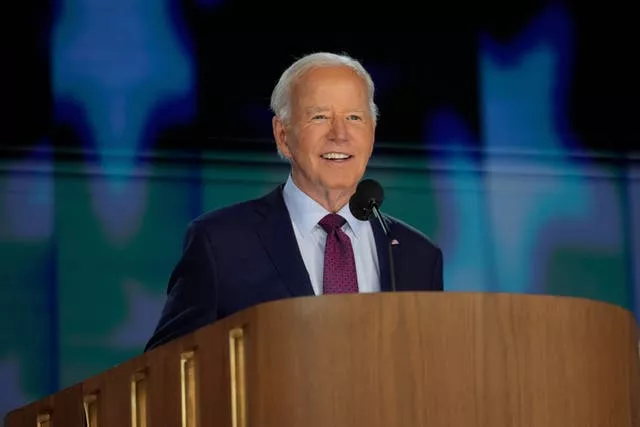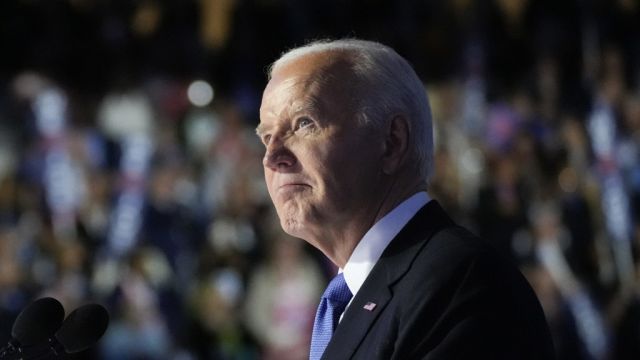An emotional Joe Biden has taken to the stage at the Democratic National Convention (DNC) in Illinois to deliver his valedictory address at the convention’s opening night.
A refreshed Democratic Party gathered on Monday night at the United Centre in Chicago as vice president Kamala Harris prepares to take up the mantle as the party’s presidential candidate in November.
But, after 52 years of rising to the pinnacle of influence within his party, Mr Biden (81) received a hero’s welcome for the act of stepping aside for Ms Harris.
A visibly emotional Mr Biden was greeted by a more than four-minute-long ovation and chants of “Thank you Joe”.
“America, I love you,” he replied.

In his keynote speech, the US president urged the thousands of attendees to put the most important thing first at the ballot box in November: democracy.
“Democracy has prevailed, democracy has delivered, and now democracy must be preserved,” he said.
He also took time to reflect on his tenure as president before handing the reins over to Kamala Harris, Mr Biden’s vice president and the Democratic presidential nominee.
“Because of you, we’ve had the most extraordinary four years of progress ever, period,” he said, before adding: “I say ‘we,’ I mean me and Kamala,’” sharing the credit for his most popular successes with the vice president who will replace him on the ticket come election day.
Mr Biden ran through his achievements during his time in the Oval Office, telling the crowds during his Monday night speech that he “ran to rebuild the backbone of America, the middle class” and went on to forge “the strongest economy in the entire world” in the wake of the Covid-19 global pandemic.

He reflected on his infrastructure Bill, spoke of his work with the unions, and took aim at gun control.
“More children are killed in America by gunshot than anywhere else,”, adding that he is proud of the legislation passed during his presidency to make America a safer place for all.
“Now it’s time to ban assault weapons,” he added,
He also touched on immigration and the ongoing war in Gaza, before shifting focus to his decision not to run for a second term.
“It’s been the honour of my lifetime to serve as president,” Mr Biden told the crowds, adding he was not hurt or upset with those who pushed for him to take a step back.
He faced growing concerns about his mental and physical acuity after struggling to complete sentences during his debate against Donald Trump.
“I love the job, but I love my country more,” Mr Biden said, before calling on voters to “beat Donald Trump and elect Kamala and Tim”.
And, in the final moments of his speech, the president summed up his 50-year career in politics with: “America, I gave my best to you.”

Ms Harris made an unannounced appearance onstage as the convention’s prime-time programme earlier on Monday evening to thank Mr Biden for his leadership in advance of his speech later on.
“Joe, thank you for your historic leadership, for your lifetime of service to our nation, and for all you’ll continue to do,” she said.
“We are forever grateful to you.”
The Democrats are looking to the week-long event to slingshot Ms Harris towards a face-off with Republican candidate Mr Trump, whose comeback bid for the White House is viewed by Democrats as an existential threat.
Having taken over the ticket just one month ago, Ms Harris must now win over a divided country that is viewing her more positively but still making up its mind about the election.
Not even a month ago, the Democrats were deeply divided over foreign policy, political strategy and Mr Biden himself, who was holding on after a disastrous debate by claiming he had a better chance than any other Democrat — including Ms Harris — of beating Mr Trump.

The convention programme also honoured the civil rights movement, with an appearance from Reverend Jesse Jackson, the founder of the Chicago-based Rainbow Push Coalition.
There were several references to Fannie Lou Hamer, the late civil rights activist who gave a landmark speech at a Democratic convention in 1964.
Ms Hamer was a former sharecropper and a leader of the Mississippi Freedom Democratic Party, a racially integrated group that challenged the seating of an all-white Mississippi delegation at the 1964 Democratic National Convention.
Ms Hamer spoke on August 22nd, 1964 — exactly 60 years before Ms Harris was set to accept the Democratic nomination and become the first black woman and first person of South Asian descent to be the presidential nominee of a major party.







